
Frankenmuth is a city in Saginaw County in the U.S. state of Michigan. The population was 4,987 at the 2020 census. The city is surrounded by Frankenmuth Township.
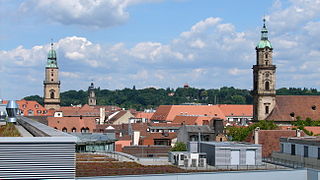
Erlangen is a Middle Franconian city in Bavaria, Germany. It is the seat of the administrative district Erlangen-Höchstadt, and with 116,062 inhabitants, it is the smallest of the eight major cities in Bavaria. The number of inhabitants exceeded the threshold of 100,000 in 1974, making Erlangen a major city according to the statistical definition officially used in Germany.
Kulmbach is a Landkreis (district) in Bavaria, Germany. It is bounded by the districts of Kronach, Hof, Bayreuth and Lichtenfels.
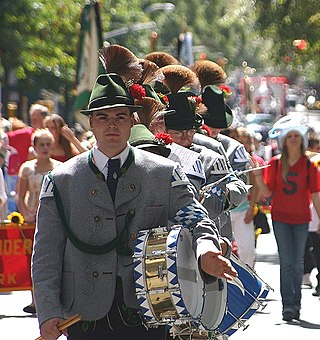
Von Steuben Day is a holiday traditionally held on a weekend in mid-September, celebrating the Prussian-born Baron Friedrich von Steuben, who arrived in the United States as a volunteer offering his services to General George Washington in the American Revolutionary War. Von Steuben is still regarded as one of the most important German Americans, as his training of the young American troops made victory against the British possible. Thus, his work helped gain independence for the United States of America. The day is generally considered the German-American event of the year, and many participants wear tracht costumes, including dirndls and lederhosen, to celebrate their heritage. Celebrations focus on parades where participants march, dance, and play music.

Beer is a major part of German culture. Only water, hops and malt are permitted as ingredients in its production, although most breweries nowadays also use yeast. Beers not exclusively using barley-malt, such as wheat beer, must be top-fermented.

A dirndl is a feminine dress which originated in German-speaking areas of the Alps. It is traditionally worn by women and girls in Austria, Bavaria, Liechtenstein, Switzerland and Alpine regions of Italy. A dirndl consists of a close-fitting bodice with a low neckline, a blouse worn under the bodice, a wide high-waisted skirt and an apron.

The Cannstatter Volksfest is an annual three-week Volksfest in Stuttgart, Germany. It is sometimes also referred to by foreign visitors as the Stuttgart Beer Festival, although it is actually more of an autumnal fair.

Augustiner-Bräu is a brewery in Munich, Germany, established in 1328. It is Munich's oldest independent brewery.
The Delaware Sängerbund is a German-American club located near Newark, Delaware.

Kitchener–Waterloo Oktoberfest is an annual nine-day festival in the twin cities of Kitchener–Waterloo, Ontario, Canada. Based on the original German Oktoberfest, it is billed as Canada's Greatest Bavarian Festival, and is the second-largest Oktoberfest in the world. It is held every October, starting on the Friday before Canadian Thanksgiving and running until the Saturday after. Estimates indicate that the event attracts roughly 700,000 visitors to Waterloo Region, Ontario every year.

A beer festival is an event at which a variety of beers are available for purchase. There may be a theme, for instance beers from a particular area, or a particular brewing style such as winter ales.
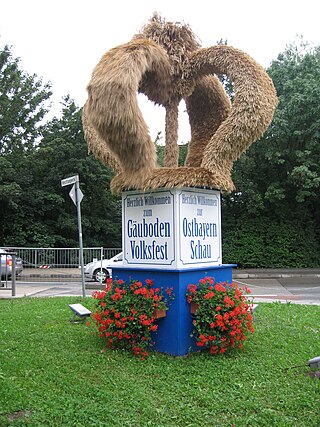
The Gäubodenvolksfest in Straubing is one of the largest Volksfests in the German state of Bavaria. It is an annual event, spanning eleven days mid-August.
A Volksfest is a large event in German-speaking countries which usually combines a beer festival or wine festival and a travelling funfair. Attractions may include amusement rides, games of chance and skill, and food and merchandise vendors.
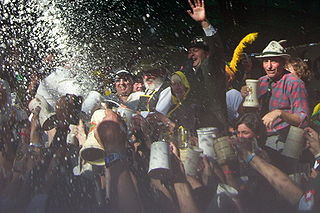
The Oktoberfest is a two-week festival held each year in Munich, Germany during late September and early October. It is attended by six million people each year and has inspired numerous similar events using the name Oktoberfest in Germany and around the world, many of which were founded by German immigrants or their descendants.

Oktoberfest is the world's largest Volksfest, featuring a beer festival and a travelling carnival, and is held annually in Munich, Bavaria, from mid- or late-September to the first Sunday in October, with more than six million international and national visitors attending the event. Locally, it is called d'Wiesn, after the colloquial name for the fairgrounds, Theresienwiese. Oktoberfest is an important part of Bavarian culture, having been held since the year 1810. Other cities across the world also hold Oktoberfest celebrations that are modeled after the original Munich event.
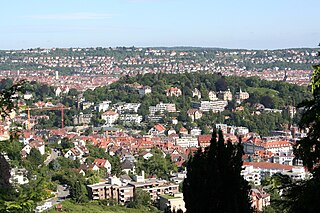
The Stuttgart Metropolitan Region is a metropolitan region in south-west Germany consisting of the cities and regions around Stuttgart, Heilbronn, Tübingen/Reutlingen. These cities are arranged into three agglomeration areas. The population of the area is about 5,300,000 and it is one of the biggest regions in Germany. This area covers an area of ca 15,000 km2.
Frühschoppen is the German and Austrian tradition of meeting up at a pub, inn, or tavern in the late morning, usually on Sundays. The specific customs vary from region to region. Frühschoppen is often a kind of brunch, but does not necessarily involve food. Frühschoppen is also often held at fun fairs, the most famous being Oktoberfest or Cannstatter Volksfest.

There are a series of tents at the Oktoberfest, which are operated by different Wiesn-hosts and in which some come from a long tradition. Some tents belong to the local breweries. The setup work for the tents often begins three months before the start of the festival.
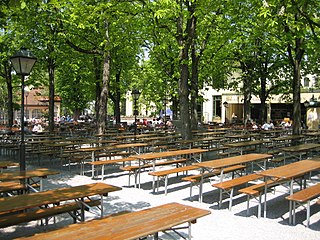
Nockherberg is the name of a small terrace on the slope of the eastern bank of the Isar in Munich, situated in the urban district of Au. An annual beer festival rich in tradition takes place there in the Paulaner Brewery - the Salvator-Ausschank auf dem Nockherberg The name of the raised terrace is often used synonymously for this festival or its opening event, the tapping of the first barrel of a strong, seasonal beer (Starkbieranstich).

The Burgberg, also sometimes referred to as Strawberry Hill, is a 332-meter-high sandstone hill in Erlangen, Germany. It was quarried in the 15th century and its southern slope has been used to house beer cellars since 1675. The cellar storage made Erlangen a pioneer concerning beer exports. The "Erlangen Bergkirchweih" has taken place in and around the cellars every Whitsun since 1775.
















